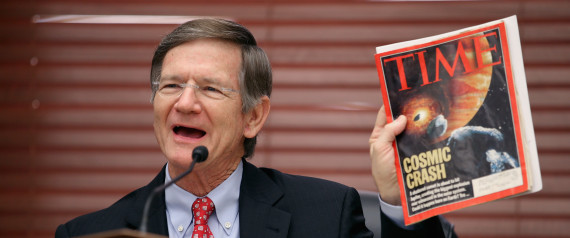WASHINGTON -- Scientists are balking at major cuts to NASA's budget that the House Committee on Science, Space and Technology approved last week, cuts that critics say will imperil climate change research in the U.S.
Source: huffingtonpost.com/
Author: Kate Sheppard
The committee-approved 2016 and 2017 NASA budgets would cut the agency's earth science funding by at least $323 million. Climate is a major part of the agency's earth science work, and NASA plays an important role among government agencies in helping to develop our scientific understanding of how the planet works.
The budget contains two different funding possibilities: "aspirational" and "constrained." Under both scenarios, the budget would be cut significantly, to figures lower than the $1.947 billion that the Obama administration had requested for fiscal year 2016.
NASA’s earth science program is funded at $1.773 billion in FY2015. The request for FY2016 is $1.947 billion. Under the bill’s aspirational scenario, it would receive $1.450 billion in FY2016. Under the constrained scenario, it would receive $1.199 billion. Using current funding and the aspirational scenario for FY2016, it would be an approximately 18 percent cut. Compared to the President’s request, it would be a roughly 26 percent cut. If the BCA caps are not removed and the constrained scenario plays out for FY2016, it would be about a 32 percent cut compared to current funding or a 38 percent cut compared to the President’s request.
The supposed rationale for the committee's cuts is that the members believe NASA should be focusing on space, not on earth science. Committee Chair Lamar Smith (R-Texas) argued that the budget will "restore balance" and "ensure the U.S. continues to lead in space for the next 50 years." The budget does allocate more funding to other areas of research.
But it's also no secret that Smith is not into climate change. Smith has referred toenvironmentalists and others who worry about climate change as "global warming alarmists" and criticized the media for not airing enough "dissenting opinions" on the subject. He recently penned an op-ed for The Wall Street Journal that decried "the climate-change religion."
"Instead of letting political ideology or climate 'religion' guide government policy, we should focus on good science," Smith wrote. "The facts alone should determine what climate policy options the U.S. considers."
But in practice, funding decisions such as the one regarding NASA's earth science budget actually help ensure that government scientists are unable to discern new facts about the planet. That's what scores of earth scientists have been reiterating since the cuts were proposed.
NASA Administrator Charles Bolden said in a statement that the budget "guts our Earth science program and threatens to set back generations worth of progress in better understanding our changing climate, and our ability to prepare for and respond to earthquakes, droughts, and storm events."
“NASA leads the world in the exploration of and study of planets, and none is more important than the one on which we live," Bolden said.
Other scientists agree.
"The research performed and supported by the division helps us understand the world we live in and provide a basis for knowledge and understanding of natural hazards, weather forecasting, air quality, and water availability, among other concerns," wrote Christine W. McEntee, executive director of the American Geophysical Union, which represents space and earth scientists, in a letter to the committee. "The applicability of these missions cannot be overstated given their impact on your constituents."
Democrats on the committee have also criticized the cut. "It’s hard to believe that in order to serve an ideological agenda, the majority is willing to slash the science that helps us have a better understanding of our home planet," wrote committee member Rep. Eddie Bernice Johnson (D-Texas) in a column for The Hill last week.
Nor has Smith seemed particularly interested in learning more on the subject. In his first year as chairman of the committee, he held more hearings on aliens than on climate science.
And last fall, when the Intergovernmental Panel on Climate Change -- the preeminent international scientific body assessing climate science -- released its latest report, Smith dismissed it in an interview, despite only having read the summary.
"We don’t know enough yet to make decisions that are going to hurt our economy or hurt the American people," he argued, adding, "Let’s continue to gather the facts, make sure the science is correct."
Original Article
Source: huffingtonpost.com/
Author: Kate Sheppard

No comments:
Post a Comment